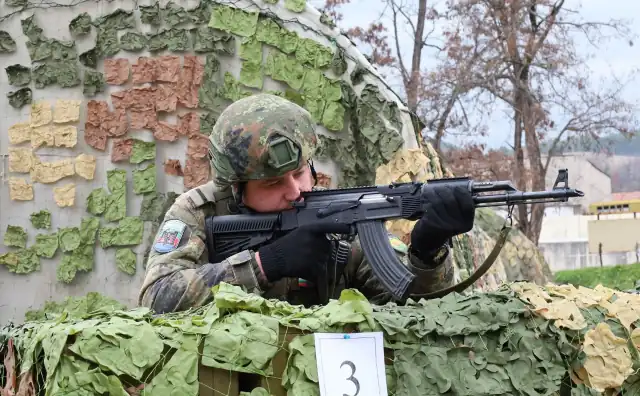
SOFIA, BULGARIA – Bulgaria’s Ministry of Defense is preparing legislative changes to introduce mandatory military training for specific professional groups, Defense Minister Atanas Zapryanov announced in an interview with Bulgarian National Radio.
The move aims to address the persistent personnel shortage in the national army by amending the Armed Forces Act and the Act on the Reserve.
However, the minister clarified that the proposal does not signal a return to compulsory military service but rather a targeted measure for certain professions.
According to Zapryanov, the training will apply to individuals in professions that require handling weapons, including personnel in the Ministry of Internal Affairs, judicial security, security companies, and the Border Police.
He emphasized that the term “mandatory” should not be confused with conscription but should instead be viewed as a necessary requirement for individuals working in these fields.
The initiative, he explained, is intended to enhance national security preparedness without imposing universal military obligations.
Bulgaria has not conducted any formal mobilization events since 2007, Zapryanov noted. However, he pointed to the ongoing war in Ukraine as an example of how modern conflicts necessitate well-prepared reserve forces.
Many European countries have taken varied approaches to this challenge, with some reinstating conscription while others have implemented mandatory training programs for key sectors.
Bulgaria’s Defense Ministry is working on an approach tailored to the country’s specific needs and will seek parliamentary approval once the legislative framework is finalized.
Bulgaria’s Stance on Regional Security and NATO Contributions
Regarding regional security, Zapryanov confirmed that Bulgaria has not been involved in a recent initiative between Croatia, Albania, and Kosovo.
While the government is aware of the declaration associated with this initiative, he stated that it has not been formally discussed at the Ministry of Defense or the Ministry of Foreign Affairs.
Instead, Bulgaria remains committed to strengthening its NATO and EU contributions, in line with its national strategy of fostering good relations, trust, and transparency with its neighbors.
The defense minister also addressed Bulgaria’s position within European defense initiatives, highlighting the importance of the “Rearm Europe” plan. He stressed that strengthening the European pillar within NATO is crucial to enhancing collective defense capabilities.
Over the past 15 years, EU-led military operations have largely relied on U.S. support, but with the current U.S. administration advocating for greater burden-sharing, European allies, including Bulgaria, are expected to increase their defense spending.
Defense Industry Modernization and Budget Allocations
The Bulgarian government, under Prime Minister Dimitar Zhelyazkov, is working to align national defense plans with NATO standards through a long-term development program set to run until 2032.
A key focus of this program is modernizing Bulgaria’s defense industry, which still relies on Soviet-era equipment. Zapryanov stressed the need for a national strategy to integrate Bulgaria’s defense sector with Western and NATO standards.
Discussing the defense budget, the minister acknowledged that while compromises have been made, increased military salaries have already yielded positive results, boosting interest in military service.
He assured that the allocated funding is sufficient to maintain the Ministry of Defense’s operational functions and support Bulgaria’s broader defense objectives.
Arrival of First F-16 Fighter Jets
Zapryanov also announced that Bulgaria will officially welcome its first F-16 fighter jet on April 12, marking a significant milestone in the modernization of the Bulgarian Air Force.
The arrival of the initial eight aircraft is expected to bring Bulgaria’s air defense capabilities closer to NATO standards. A second batch of F-16s is set to follow, allowing the country to establish a fully operational squadron.
With these measures, Bulgaria aims to strengthen its defense capabilities and align itself with modern security requirements amid evolving regional and global threats.
This article was created using automation technology and was thoroughly edited and fact-checked by one of our editorial staff members
